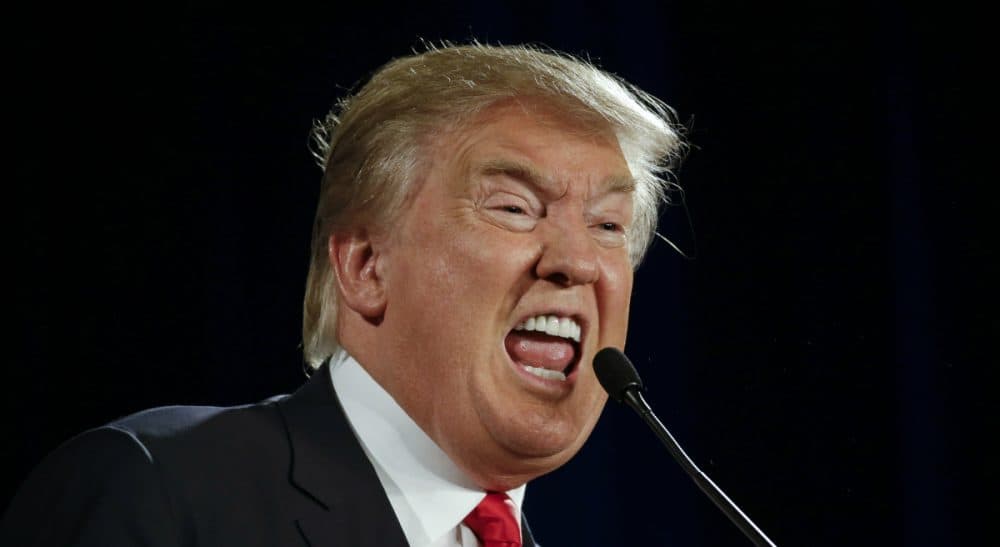Advertisement
Trumped Up Appeal? Dissecting The Donald’s Surprising Popularity

“Donald Trump isn’t an embarrassment to our country, he’s an indictment of it. The fact that he is the Conservative frontrunner for the highest job in the land – with absolutely zero experience and flaunting a ticket of unbridled bigotry, xenophobia and misogyny – clearly shows everything that is wrong with America.”
Trump owes much of his support to the way he says what he says, and to the fact that others aren’t saying it.
The above text is featured in a meme that has been circulating social media for the past couple of weeks. Bigotry, xenophobia and misogyny are foundational elements of the Trump campaign. Increasing public support for that campaign indicates a disheartening resonance of such attitudes with a sizable portion of Americans. According to a recent Des Moines Register and Bloomberg Politics Iowa Poll, the number of Trump supporters who want to “round up” and deport undocumented immigrants is 73 percent, compared with 40 percent of other GOP candidate supporters, suggesting that Trump’s inflammatory and fear-mongering (not to mention inaccurate) statements characterizing undocumented immigrants as violent criminals may, unfortunately, hold sway with voters.
The source of Trump’s popularity, however, can’t be distilled to hate and fear. There’s more to it than that. Forty-five percent of likely Republican Iowa caucus-goers reportedly stated that “personal qualities and experiences” were more important to them than “right positions on issues” when selecting a candidate to support. Trump -- the outsider, the celebrity, the rule-breaker -- appears to be attracting a large number of that 45 percent.
Writers for The Atlantic and CNN recently asked Trump enthusiasts to explain their support. The responses varied, and while some drew on Trump’s inchoate policy positions, another theme emerged, one not closely connected with policy: Trump owes much of his support to the way he says what he says, and to the fact that others aren’t saying it.
Americans, we are told again and again, are sick of “politics as usual.” Congress and the Supreme Court had historically low approval ratings of 7 and 30 percent, respectively, in 2014. The same year, presidential approval hovered near a record-low 29 percent. Such deep distrust in establishment politics has turned many people off to the usual talking points, polished speeches and even political experience -- an attribute typically regarded as desirable in a presidential candidate.
A collection of branding experts who analyzed Trump and his campaign identified five key branding categories behind his popularity, two of which involve his rhetoric: fitting the Outlaw archetype and “speaking his mind.” Trump is a so-called Outlaw because he “doesn’t operate according to the traditional rules of politics.” He “speaks his mind” — that is, he eschews political correctness, saying what others won’t, from calling politicians “stupid” (as he stands on a stage with nine politicians), to making outlandish statements about the Mexican government and Mexican immigrants.
Jeff Polet, associate professor of political science at Hope College in Holland, Michigan, says, “When you live in an age where everything a politician says is focus-group-tested and carefully crafted and managed...someone who says something different -- even if it's objectionable and stupid -- is going to sound wise or at least interesting by comparison.”
Meg Mott, professor of political theory and gender studies at Marlboro College in Vermont, suggests that Trump’s rhetoric takes its cue from public anxieties in the aftermath of both 9/11 and the recession. “In the Spanish-speaking world, this type of leader is known as a Caudillo, the man on horseback who takes out the bad guys and leads his people to safety.” Trump has long played the tough-guy role — it was, perhaps, the most notable characteristic of his TV persona. Bravado is Trump’s brand, and while it sets him apart, it doesn’t make him authentic.
Bravado is Trump’s brand, and while it sets him apart, it doesn’t make him authentic.
Does the fact that Trump speaks his mind mean that he is honest? Maybe, but the more important question is: What is on his mind? Candor about one’s views does not mean that those views reflect reality -- a distinction that may be obscured when one expresses those views loudly and with great confidence, a Trump hallmark.
It’s troubling that many people would overlook or even get behind Trump’s inflammatory positions for the sake of perceived honesty and authenticity. Let’s hope that, as the 2016 election season intensifies, so will critical scrutiny of Trump’s persona and its mystifying appeal. The more his act is revealed for what it is -- noise and branding -- the more his supporters will have to reckon with what he actually says, not just how he says it.

